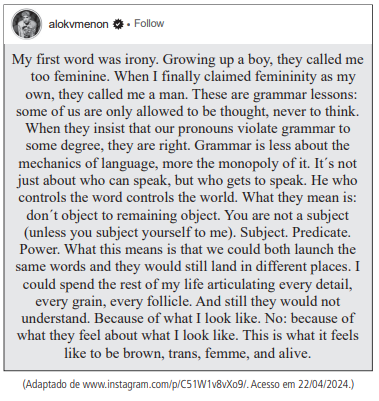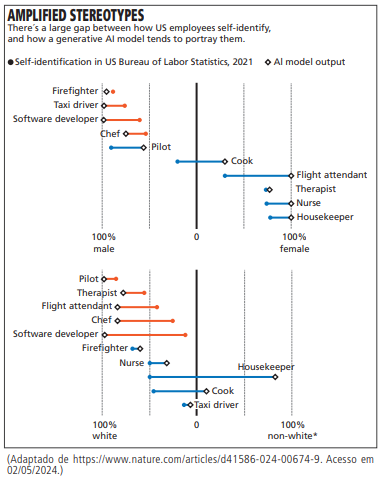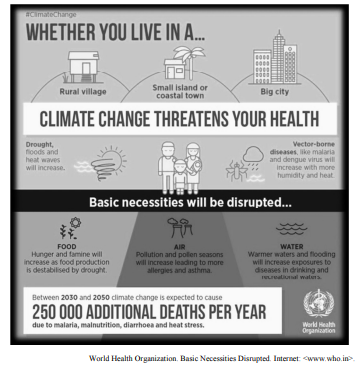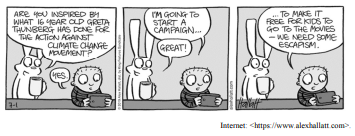Questões de Vestibular
Sobre interpretação de texto | reading comprehension em inglês
Foram encontradas 4.844 questões
T E X T
Han Kang Is Awarded Nobel Prize in Literature
Han Kang, the South Korean author best known for her surreal, subversive novel, “The Vegetarian,” was awarded the Nobel Prize in Literature [2024] — the first writer from her country to receive the award.
Mats Malm, the permanent secretary of the Swedish Academy, which organizes the prize, said at a news conference in Stockholm that Han was receiving the honor “for her intense poetic prose that confronts historical traumas and exposes the fragility of human life.”
“The Vegetarian,” published in Korea in 2007, won the 2016 International Booker Prize after it was translated into English. Porochista Khakpour, in a review of “The Vegetarian” for The New York Times, said that Han “has been rightfully celebrated as a visionary in South Korea.”
Han’s Nobel was a surprise. But the news was celebrated by authors and fans on social media, and greeted with fanfare in South Korea. “This is a great achievement for South Korean literature and an occasion for national celebration,” said President Yoon Suk Yeol in a statement, in which he noted Han’s ability to capture painful episodes from their country’s recent history. Members of the K-pop band BTS also celebrated, with one posting a crying-face emoji and a heart alongside a picture of Han. Han’s groundbreaking work has reshaped the literary landscape in South Korea, said Paige Aniyah Morris, co-translator of Han’s novel, “We Do Not Part,” which will be published by Hogarth in the United States in January.
“Han’s work has inspired a generation of Korean writers to be more truthful and more daring in their subject matter,” Morris said. “Time and time again, she has braved a culture of censorship and saving face, and she has come out of these attempts at silencing her with stronger, more unflinching work each time.”
Han, 53, was born in 1970 in Gwangju, South Korea. Her father was also a novelist, but much less successful. The family struggled financially and moved frequently. In a 2016 interview with The Times, Han said her transitory upbringing “was too much for a little child, but I was all right because I was surrounded by books.” When Han was 9, her family moved to Seoul just months before the Gwangju uprising, when government troops fired on crowds of pro-democracy protesters, killing hundreds. The event shaped her views on humanity’s capacity for violence, Han said in the 2016 interview, and its specter has haunted her writing. In her 2014 novel “Human Acts,” a writer observes a police raid on a group of activists.
She also recalled seeing images of people who lined up to donate their blood to those who were injured in the uprising. “It was like two unsolvable riddles imprinted on my mind: How can humans be so violent, and how can humans be so sublime?” she said. “When I write novels, I find myself always returning to the theme of what it means to be human.”
Han studied literature at Yonsei University in Korea, and her first published works were poems. Her debut novel, “Black Deer,” which came out in 1998, was a mystery about a missing woman. Following her debut, Han went on to write seven more novels, as well as several novellas and collections of essays and short stories. Among her other novels are “The White Book,” which was also nominated for the International Booker Prize, and “Greek Lessons,” published in English in 2023.
“Han Kang is a visionary — there’s no other word for it,” said Parisa Ebrahimi, executive editor at Hogarth, Han’s North American publisher, who noted that Han’s work reflects “remarkable insight into the inner lives of women.”
Han’s writing is now celebrated in South Korea, but that took some time. She had been publishing fiction and poetry for more than two decades before her work was issued in English, after Deborah Smith translated “The Vegetarian” and sold it to a British publisher based on the first 10 pages. “Her work, and the translation and success of her work, has led Korean literature in translation to be edgier and more experimental and daring,” said Anton Hur, a South Korean translator and author who is based in Seoul. “She changed the conversation about Korean literature.”
Ankhi Mukherjee, a literature professor at the University of Oxford, said that she had taught Han’s work “year in, year out” for almost two decades. “Her writing is relentlessly political — whether it’s the politics of the body, of gender, of people fighting against the state — but it never lets go of the literary imagination,” Mukherjee said, adding: “It’s never sanctimonious; it’s very playful, funny and surreal.
The Nobel Prize is literature’s pre-eminent award, and winning it is a capstone to a writer. Along with the prestige and a huge boost in sales, the new laureate receives 11 million Swedish krona, about $1 million. In recent years, the academy has tried to increase the diversity of authors considered for the literature prize, after facing criticism over the low number of laureates who were female or came from outside Europe and North America.
Han is the 18th woman to receive the Nobel in literature, which has been awarded to 120 writers since 1901. Some scholars and translators said it was fitting that the first Korean writer to win a Nobel is a woman. Much of the most groundbreaking and provocative contemporary Korean literature is being written by female novelists, including some who are challenging and exposing misogyny and the burdens that are placed on women in South Korea.
Adapted from: https://www.nytimes.com/2024/10/10/
T E X T
Han Kang Is Awarded Nobel Prize in Literature
Han Kang, the South Korean author best known for her surreal, subversive novel, “The Vegetarian,” was awarded the Nobel Prize in Literature [2024] — the first writer from her country to receive the award.
Mats Malm, the permanent secretary of the Swedish Academy, which organizes the prize, said at a news conference in Stockholm that Han was receiving the honor “for her intense poetic prose that confronts historical traumas and exposes the fragility of human life.”
“The Vegetarian,” published in Korea in 2007, won the 2016 International Booker Prize after it was translated into English. Porochista Khakpour, in a review of “The Vegetarian” for The New York Times, said that Han “has been rightfully celebrated as a visionary in South Korea.”
Han’s Nobel was a surprise. But the news was celebrated by authors and fans on social media, and greeted with fanfare in South Korea. “This is a great achievement for South Korean literature and an occasion for national celebration,” said President Yoon Suk Yeol in a statement, in which he noted Han’s ability to capture painful episodes from their country’s recent history. Members of the K-pop band BTS also celebrated, with one posting a crying-face emoji and a heart alongside a picture of Han. Han’s groundbreaking work has reshaped the literary landscape in South Korea, said Paige Aniyah Morris, co-translator of Han’s novel, “We Do Not Part,” which will be published by Hogarth in the United States in January.
“Han’s work has inspired a generation of Korean writers to be more truthful and more daring in their subject matter,” Morris said. “Time and time again, she has braved a culture of censorship and saving face, and she has come out of these attempts at silencing her with stronger, more unflinching work each time.”
Han, 53, was born in 1970 in Gwangju, South Korea. Her father was also a novelist, but much less successful. The family struggled financially and moved frequently. In a 2016 interview with The Times, Han said her transitory upbringing “was too much for a little child, but I was all right because I was surrounded by books.” When Han was 9, her family moved to Seoul just months before the Gwangju uprising, when government troops fired on crowds of pro-democracy protesters, killing hundreds. The event shaped her views on humanity’s capacity for violence, Han said in the 2016 interview, and its specter has haunted her writing. In her 2014 novel “Human Acts,” a writer observes a police raid on a group of activists.
She also recalled seeing images of people who lined up to donate their blood to those who were injured in the uprising. “It was like two unsolvable riddles imprinted on my mind: How can humans be so violent, and how can humans be so sublime?” she said. “When I write novels, I find myself always returning to the theme of what it means to be human.”
Han studied literature at Yonsei University in Korea, and her first published works were poems. Her debut novel, “Black Deer,” which came out in 1998, was a mystery about a missing woman. Following her debut, Han went on to write seven more novels, as well as several novellas and collections of essays and short stories. Among her other novels are “The White Book,” which was also nominated for the International Booker Prize, and “Greek Lessons,” published in English in 2023.
“Han Kang is a visionary — there’s no other word for it,” said Parisa Ebrahimi, executive editor at Hogarth, Han’s North American publisher, who noted that Han’s work reflects “remarkable insight into the inner lives of women.”
Han’s writing is now celebrated in South Korea, but that took some time. She had been publishing fiction and poetry for more than two decades before her work was issued in English, after Deborah Smith translated “The Vegetarian” and sold it to a British publisher based on the first 10 pages. “Her work, and the translation and success of her work, has led Korean literature in translation to be edgier and more experimental and daring,” said Anton Hur, a South Korean translator and author who is based in Seoul. “She changed the conversation about Korean literature.”
Ankhi Mukherjee, a literature professor at the University of Oxford, said that she had taught Han’s work “year in, year out” for almost two decades. “Her writing is relentlessly political — whether it’s the politics of the body, of gender, of people fighting against the state — but it never lets go of the literary imagination,” Mukherjee said, adding: “It’s never sanctimonious; it’s very playful, funny and surreal.
The Nobel Prize is literature’s pre-eminent award, and winning it is a capstone to a writer. Along with the prestige and a huge boost in sales, the new laureate receives 11 million Swedish krona, about $1 million. In recent years, the academy has tried to increase the diversity of authors considered for the literature prize, after facing criticism over the low number of laureates who were female or came from outside Europe and North America.
Han is the 18th woman to receive the Nobel in literature, which has been awarded to 120 writers since 1901. Some scholars and translators said it was fitting that the first Korean writer to win a Nobel is a woman. Much of the most groundbreaking and provocative contemporary Korean literature is being written by female novelists, including some who are challenging and exposing misogyny and the burdens that are placed on women in South Korea.
Adapted from: https://www.nytimes.com/2024/10/10/
Politics of attributing extreme events to climate change
Climate change shapes weather events. However, describing it as the cause of disasters can be misleading, since disasters are caused by pre-existing fragilities and inequalities on the ground. Attribution is not neutral. Hence, analytic frames that attribute disaster to climate can divert attention from place-based vulnerabilities and their sociopolitical causes. While politicians may blame climate change, the public may hold the government accountable for inadequate investments in flood or drought prevention. To be strategic and moral, framing choices must therefore be sensitive to context and to how the values implicit within analytic frames about the causes of disasters shape policy responses. Such sensitivity requires multicausal analysis of weather-linked disasters to reduce the damages. Through examples from around the world, especially Brazil, we discuss how and why climate-centric disaster framing can erase from view—and, thus, from policy agendas—the very socioeconomic and political factors that centrally cause vulnerability and suffering in weather extremes.
(Adaptado de https://wires.onlinelibrary.wiley.com/doi/full/10.1002/wcc.750. Acesso em 15/05/2024.)
Qual alternativa expressa corretamente os argumentos dos autores do texto?

No post, a argumentação é articulada a partir dos diferentes sentidos das palavras
“Parable of the Talents” (Octavia E. Butler)
“To survive, Let the past Teach you-- Past customs, Struggles, Leaders and thinkers. Let These Help you. Let them inspire you, Warn you, Give you strength. But beware: God is Change. Past is past. What was Cannot Come again. To survive, know the past. Let it touch you. Then let The past Go.”
(BUTLER, Octavia E. Parable of the Talents. New York, Durham and London: Open Road, 1998.)
O texto 2 toca em um aspecto central do afrofuturismo e remete ao tema do questionamento do texto 1. Assim, pode-se dizer que o poema reconhece que
Images generated with artificial intelligence (AI) are often not faithful representations of reality. The chart illustrates the level of disparity between a realistic representation of race and gender in various professions and the images generated by AI. The center line in this graph means equal representation. In one case, AI-generated images exclusively represented a certain profession as being held by white males, even though it is actually held by a range of men, women, white, and non-white people. In another case, although more than half of the people holding this position self-identified as white, AI represented it as being held solely by women who were primarily non-white.

Considerando as informações da figura, quais as duas profissões referidas no texto?
A imagem a seguir apresenta a transcrição de um diálogo em um vídeo publicado no Instagram.

No diálogo, a principal característica da reformulação da fala da médica é a inserção de
Leia o texto a seguir.
Police under fire after threat to arrest
‘openly Jewish’ man near pro-Palestinian
protest
Scotland Yard criticised after suggesting Gideon Falter’s presence was ‘provocative’ and he was ‘antagonising’ protesters
(https://www.telegraph.co.uk/news/2024/04/19/. Acesso em 20/04/2024.)
Depreende-se, da leitura desse texto, que
The passage “We will ask questions of ‘literature,’ ‘environment,’ and ‘activism,’ and the intersections between them”, at the end of the text, means that students will
B study and discuss topics in these areas.
The module focuses on American authors who wrote fiction during the 19th century.
The text informs the reader about a course offered to students interested in writing their own literary works on nature.
At the beginning of the text, the expression “quietly subversive” means that the authors associated to environmental writing establish their point of view on environmental topics in a discreet and subtle way.
With the infographic, the World Health Organization wants to inform that two hundred and fifty thousand people will die by 2050.
One of the main goals of the text is to draw attention to the relationship between vector-borne diseases and the lack of clean water.
Judge the items from 23 through 26 based on the preceding infographic.
According to the infographic, the entire population will suffer the effects of the climate change irrespective of where people live.
The passage “to make it free for kids to go to the movies” (third box) can be correctly rewritten as to make kids free to go to the cinema.
In can be inferred from the use of the structure “I’m going to start” (second box) that the kid had already considered the idea of starting a campaign and has decided to go for it.
The kid’s answer indicates that he is not aware of who Greta Thunberg is, nor of what she has done.
The comic strip shows that, for the kid, going to the movies is a way of thinking about something other than climate change.

